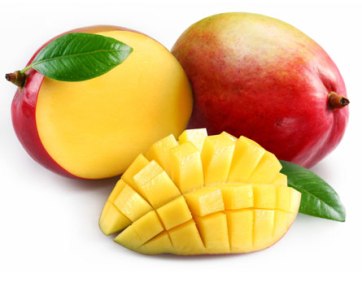Are the items in your pantry helping you create optimal health & fitness?
This blog is a continuation of the countdown of 100 Best Health Foods. If you missed the first 1-5 read it here:
100 Best Health Foods – Volume 2: 1-5
Below are 5 more of the healthiest foods available that should definitely be in your fridge or pantry along with their benefits, nutritional content & interesting facts or tips to help bring you optimal health:
- Mangoes…
Nutrition per 100 g:
- Calories: 60
- Fat: 3 g
- Protein: 8 g
- Carbohydrates: 15 g
- Fibre: 6 g
- Sugar: 14 g
- Vitamin C: 74 mg
Benefits:
- Mangos are rich in antioxidants, vitamin C & vitamin E.
- Mangoes are a rich source of pectin, a soluble fibre that helps reduce ‘bad’ cholesterol.
- Mangoes provide a high source of potassium which help regulate blood pressure.
Tips:
Wait for mangoes to fully ripen & eat them raw for maximum vitamin C content. Also, if you eat them with a little fat like whole yoghurt or salad with olive oil your body will better absorb the carotenes.
Bear in mind mangoes are high GI. This doesn’t make them bad but it could mean you shouldn’t eat them till you deserve them! If you do not deserve your carbs then they will make you fat.
As mentioned in the previous article timing & amount is key.
- Pears…
Nutrition per 100 g:
- Calories: 60
- Fat: Trace
- Protein: 5 g
- Carbohydrates: 15 g
- Fibre: 3 g
- Sugar: 10 g
- Vitamin C: 9 mg
- Potassium: 225 mg
Benefits:
- Pears are known as a hypoallergenic (without allergic reaction) & an antibacterial.
- They are high in fibre & contain antioxidants which help prevent cancer & gastroenteritis (stomach & intestine inflammation)
- Pears contain vitamin C & are a good source of potassium.
Interesting Facts:
- Pears are safe for most children & many people with food allergies.
- In order to keep pears from browning quickly, sprinkle the cut sides with lemon juice.
- Papayas…
Nutrition per 100 g:
- Calories: 43
- Fat: 4 g
- Protein: 5 g
- Carbohydrates: 11 g
- Fibre: 7 g
- Sugar: 8 g
- Vitamin C: 180 mg
- Potassium: 780 mg
- Beta-Carotene: 839 mcg
- Beta-Cryptoxanthin: 2313 mcg
- Magnesium: 30 mg
- Lutein/Zeaxanthin: 228 mcg
Benefits:
- Papayas are rich in beta-carotene which can help prevent prostate cancer.
- Papayas are a good source of carotenes lutein & zeaxanthin which helps protect eyes from macular degeneration.
- They provide a great source of vitamin C, fibre & beta-cryptoxanthin which helps maintain healthy lungs & may help prevent arthritis.
Interesting Facts:
The tropical papaya is sometimes referred to as a ‘pawpaw’.
- Oranges…
Nutrition per 100 g:
- Calories: 47
- Fat: Trace
- Protein: 1 g
- Carbohydrates: 12 g
- Fibre: 4 g
- Sugar: 9 g
- Vitamin C: 64 mg
- Potassium: 238 mg
- Calcium: 61 mg
- Lutein/Zeaxanthin: 182 mcg
Benefits:
- Oranges are one of the best & also least expensive sources of vitamin C. Vitamin C prevents against aging, disease, & damage to the body on a cellular level.
- Oranges are low on the glycemic index (Remember juicing alters the GI of a food)
- They provide soluble fibre pectin which helps lower cholesterol.
- Oranges are high in antioxidants & red anthocyanin pigments which have been linked to cancer prevention.
- Oranges are an anti-inflammatory which helps to reduce the frequency of problems with arthritis.
Interesting Facts:
Oranges stored in the refrigerator better retain their vitamin C.
- Pineapples…
Nutrition per 100 g:
- Calories: 50
- Fat: Trace
- Protein: 5 g
- Carbohydrates: 13 g
- Fibre: 2 g
- Sugar: 10 g
- Vitamin C: 30 mg
- Potassium: 97 mg
- Magnesium: 10 mg
Benefits:
- Pineapples can help reduce the risk of blood clots.
- They may aid in digestion & limit pain from arthritis & joint conditions.
- Pineapples are a good source of the antioxidant vitamin C.
- They are a good source of ferulic acid, which can help prevent cancer.
Interesting Facts:
- Pineapples originally moved around the globe because sailors kept them on ships to ward off scuvy.
- Sailors would wash pineapples down with a ‘pony’ (measure) of rum.
To Your Best Health,
p.s.
To Receive Quality Info Like This Straight To Your Email: Click Me!
P.S. Keep an eye out for the next installments of the 100 Best Health Foods!
Resources:
100 Best Health Foods, The ultimate superfoods for healthy living including 100 nutritious recipes, Love Food
http://topfoodfacts.com/20-interesting-facts-about-grape/
http://www.kingoffruit.com.au/fun-pineapple-facts.html
